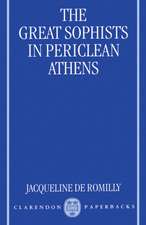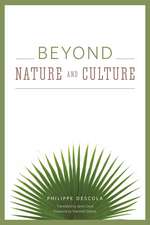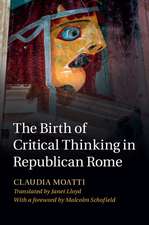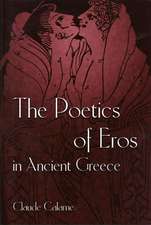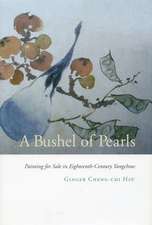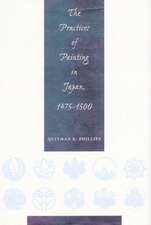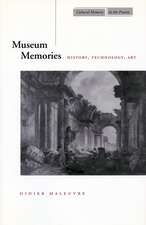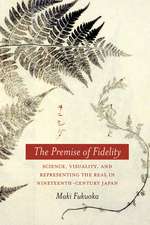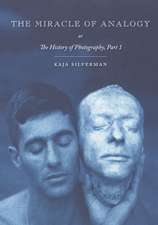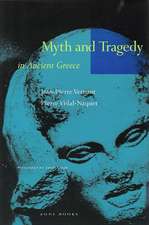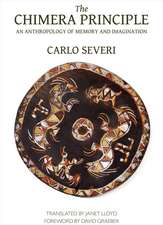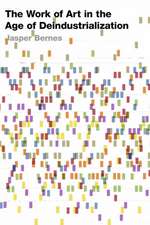The Cult of Art in Nazi Germany: Cultural Memory in the Present
Autor Eric Michaud Traducere de Janet Lloyden Limba Engleză Paperback – 29 apr 2004
The Cult of Art in Nazi Germany presents a new interpretation of National Socialism, arguing that art in the Third Reich was not simply an instrument of the regime, but actually became a source of the racist politics upon which its ideology was founded. Through the myth of the "Aryan race," a race pronounced superior because it alone creates culture, Nazism asserted art as the sole raison d'être of a regime defined by Hitler as the "dictatorship of genius." Michaud shows the important link between the religious nature of Nazi art and the political movement, revealing that in Nazi Germany art was considered to be less a witness of history than a force capable of producing future, the actor capable of accelerating the coming of a reality immanent to art itself.
| Toate formatele și edițiile | Preț | Express |
|---|---|---|
| Paperback (1) | 213.10 lei 3-5 săpt. | |
| Stanford University Press – 29 apr 2004 | 213.10 lei 3-5 săpt. | |
| Hardback (1) | 728.70 lei 6-8 săpt. | |
| Stanford University Press – 29 apr 2004 | 728.70 lei 6-8 săpt. |
Din seria Cultural Memory in the Present
-
 Preț: 173.10 lei
Preț: 173.10 lei -
 Preț: 197.12 lei
Preț: 197.12 lei -
 Preț: 365.56 lei
Preț: 365.56 lei -
 Preț: 193.14 lei
Preț: 193.14 lei -
 Preț: 194.26 lei
Preț: 194.26 lei -
 Preț: 155.84 lei
Preț: 155.84 lei -
 Preț: 155.89 lei
Preț: 155.89 lei -
 Preț: 149.68 lei
Preț: 149.68 lei -
 Preț: 211.98 lei
Preț: 211.98 lei -
 Preț: 228.62 lei
Preț: 228.62 lei -
 Preț: 206.94 lei
Preț: 206.94 lei -
 Preț: 209.36 lei
Preț: 209.36 lei -
 Preț: 193.58 lei
Preț: 193.58 lei -
 Preț: 156.25 lei
Preț: 156.25 lei -
 Preț: 146.22 lei
Preț: 146.22 lei -
 Preț: 171.47 lei
Preț: 171.47 lei -
 Preț: 194.45 lei
Preț: 194.45 lei -
 Preț: 229.26 lei
Preț: 229.26 lei -
 Preț: 296.64 lei
Preț: 296.64 lei -
 Preț: 210.24 lei
Preț: 210.24 lei -
 Preț: 228.62 lei
Preț: 228.62 lei -
 Preț: 278.31 lei
Preț: 278.31 lei -
 Preț: 298.62 lei
Preț: 298.62 lei -
 Preț: 153.16 lei
Preț: 153.16 lei -
 Preț: 193.58 lei
Preț: 193.58 lei -
 Preț: 204.76 lei
Preț: 204.76 lei -
 Preț: 228.39 lei
Preț: 228.39 lei -
 Preț: 139.64 lei
Preț: 139.64 lei -
 Preț: 243.46 lei
Preț: 243.46 lei -
 Preț: 201.90 lei
Preț: 201.90 lei -
 Preț: 152.36 lei
Preț: 152.36 lei -
 Preț: 226.40 lei
Preț: 226.40 lei -
 Preț: 169.59 lei
Preț: 169.59 lei -
 Preț: 197.12 lei
Preț: 197.12 lei -
 Preț: 194.88 lei
Preț: 194.88 lei -
 Preț: 170.65 lei
Preț: 170.65 lei -
 Preț: 194.45 lei
Preț: 194.45 lei -
 Preț: 151.12 lei
Preț: 151.12 lei -
 Preț: 194.01 lei
Preț: 194.01 lei -
 Preț: 194.45 lei
Preț: 194.45 lei -
 Preț: 208.06 lei
Preț: 208.06 lei -
 Preț: 196.69 lei
Preț: 196.69 lei -
 Preț: 142.73 lei
Preț: 142.73 lei -
 Preț: 466.14 lei
Preț: 466.14 lei -
 Preț: 167.15 lei
Preț: 167.15 lei -
 Preț: 194.45 lei
Preț: 194.45 lei -
 Preț: 173.51 lei
Preț: 173.51 lei -
 Preț: 232.11 lei
Preț: 232.11 lei -
 Preț: 207.13 lei
Preț: 207.13 lei -
 Preț: 150.09 lei
Preț: 150.09 lei
Preț: 213.10 lei
Nou
Puncte Express: 320
Preț estimativ în valută:
40.78€ • 42.42$ • 33.67£
40.78€ • 42.42$ • 33.67£
Carte disponibilă
Livrare economică 24 martie-07 aprilie
Preluare comenzi: 021 569.72.76
Specificații
ISBN-13: 9780804743273
ISBN-10: 0804743274
Pagini: 368
Ilustrații: 110 illustrations
Dimensiuni: 165 x 210 x 23 mm
Greutate: 0.5 kg
Ediția:1
Editura: Stanford University Press
Colecția Stanford University Press
Seria Cultural Memory in the Present
ISBN-10: 0804743274
Pagini: 368
Ilustrații: 110 illustrations
Dimensiuni: 165 x 210 x 23 mm
Greutate: 0.5 kg
Ediția:1
Editura: Stanford University Press
Colecția Stanford University Press
Seria Cultural Memory in the Present
Recenzii
"The Cult of Art in Nazi Germany is a provocative attempt to analyze systematically an essential characteristic of the National Socialist state, namely, the unification of art and ritual in what the author sees as 'the Nazi myth.'"—History of Religions
"...this is an intriguing book that will undoubtedly fascinate many who are interested in theories about images and their potential power."—Journal of Modern History
"[T]his well-researched and nicely illustrated book analyzes the place of art within National Socialist ideology and culture....anyone with an interest in Nazism or art history, including non-specialists, stands to benefit from reading this book."—Canadian Journal of History/Annales canadiennes d'histoire
"A good book for anyone interested in getting into the "why" of the Nazi movement."—The NYMAS Review
"A highly original work offering a wealth of new material and a radically new perspective. It could be said that this book is a highly convincing documentation of Walter Benjamin's famous statement that fascism is the aestheticisation of politics. Michaud's analysis is provocative and disquieting because it relentlessly reveals the deep interrelation of a long aesthetic and artistic tradition of the 'creative artist' and central motifs of Christianity."—Rainer Nägele, Johns Hopkins University
"Closely argued and intellectually dazzling, this study is essential reading, not only for historians of twentieth-century art, but for anyone interested in the visual culture of modernity."—Brigid Doherty, Princeton University
"Closely argued and intellectually dazzling, this study is essential reading, not only for historians of twentieth-century art, but for anyone interested in the visual culture of modernity."—Brigid Doherty, Princeton University
Notă biografică
Eric Michaud is Professor at the École des Hautes Études en Sciences Sociales, Paris.
Textul de pe ultima copertă
“A highly original work offering a wealth of new material and a radically new perspective. It could be said that this book is a highly convincing documentation of Walter Benjamin’s famous statement that fascism is the aestheticisation of politics. Michaud’s analysis is provocative and disquieting because it relentlessly reveals the deep interrelation of a long aesthetic and artistic tradition of the ‘creative artist’ and central motifs of Christianity.”—Rainer Nägele, Johns Hopkins University
“Closely argued and intellectually dazzling, this study is essential reading, not only for historians of twentieth-century art, but for anyone interested in the visual culture of modernity.”—Brigid Doherty, Princeton University
“Closely argued and intellectually dazzling, this study is essential reading, not only for historians of twentieth-century art, but for anyone interested in the visual culture of modernity.”—Brigid Doherty, Princeton University
Descriere
The Cult of Art in Nazi Germany presents a new interpretation of National Socialism, arguing that art in the Third Reich was not simply an instrument of the regime, but actually became a source of the racist politics upon which its ideology was founded.


